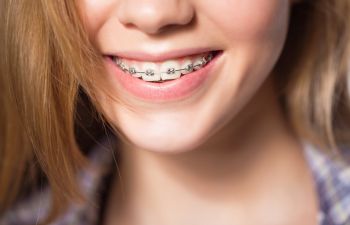
When you have traditional, nonremovable braces, keeping your braces and teeth clean is paramount in order to prevent caries and gingivitis from developing. Your oral health depends on practicing optimal oral hygiene. Neglecting these practices could leave you facing pockets of tooth decay and gum disease after your braces come off.
Your Braces and Tooth Decay
One reason you may have had braces put on in the first place is to help your teeth and gums become less susceptible to disease. It then becomes a little ironic that the treatment can lead to the problems you are working to prevent. Food particles and sugar from certain beverages can become lodged around the braces. If not cleaned away, harmful bacteria will begin to feed on these accumulations. This creates the formation of plaque, which in turn will lead to caries and gum disease.
Tooth decay may go unnoticed at first, especially in the back teeth where it would be harder to see problems. You may not even realize you have any problems until you experience symptoms such as:
- Toothaches
- Pain when you chew your food
- Sensitivity to cold or hot food and beverages
- Sensitivity to sweets
Hopefully, any problems will be identified before you have symptoms; but if left untreated, you could eventually develop serious gum disease and/or tooth infection if the decay were to reach the pulp or nerve center of the tooth. Neglecting developing cavities can lead to an abscessed tooth or possible jaw problems. Practicing good oral hygiene from the outset can avoid these problems.
Your Oral Care Regime
When you get your braces, you will also be given instructions on how to maintain good oral health while wearing them. Your orthodontist may also suggest certain dental products for you to use during this time. By following a few simple guidelines, you should be able to avoid serious problems.
- Follow instructions for cleaning your teeth and gums as suggested by your orthodontist.
- Avoid foods that are chewy or sticky such as caramels and chewing gum.
- Avoid hard, crunchy foods such as apples and carrots.
- Avoid chewing ice and hard objects like pencils, pens and your fingernails.
- See your orthodontist regularly as advised.
- Schedule regular dental checkups for examination and professional cleanings.
- Use a water jet to flush out trapped food particles.
- Use a floss threader to make flossing easier.
- Rinse your mouth out four times a day with salt water to help prevent minor gum inflammation.
Your orthodontist will give you specific instructions on how to maintain your best oral hygiene. You will also be given instructions on what to do if you encounter problems such as cuts or scrapes from your braces. Since your braces can be harder on toothbrushes than your teeth, you should replace your toothbrush every three months.
By following your orthodontist’s guidelines and eating a healthy diet minus the foods you should avoid, your teeth will be straight and healthy when your braces are removed. At Broad Street Braces, we help you develop a beautiful, healthy smile. Contact us today to schedule a consultation with one of our orthodontists.
Posted on behalf of
1819 S Broad St
Philadelphia, PA , 19148
Phone: (215) 234-3030
Email: BSBfrontdesk@broadstreetbraces.com
Mon – 8am to 5pm
Tue – 8am to 5pm
Wed – 8am to 5pm
Thu – 8am to 5pm
Fri – 8am to 1pm
